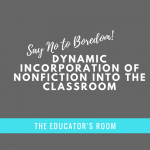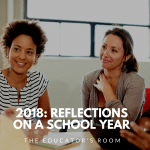April 11, 2014:
I am excited to be at this conference. I am a huge history nerd, so of course going to a conference that helps fulfill that love is nice. I am also an educator so I am interested in how this conference of historians could relate to my and other’s educational practices.
My day started late. Since I work, I had to come in late. Not that made the conference any less interesting. While waiting for a session to start I wondered through the exhibit room looking at books that were for sale to all of the #OAH2013 attendees. Let’s just say that some of the booths have some really cool books. I wish I had more money and bookshelves. Favorite finds: Signed book by David Chappell called Waking from the Dream: The Struggle for Civil Rights in the Shadow of Martin Luther King, Jr., and two graphic novels. One is about the U.S. Constitution and the other is about Margaret Sanger. There are a lot of booths, but I didn’t have time to explore. That is for Saturday.
As for the sessions, I only was able to catch one on Friday because of work and distance. That being said, the session I ended up going to was a great session. I attended a very packed panel called The Future of Teaching History: Using Technology to make Teaching More Fun and Effective. In this session, the discussion was about how college faculty members should work towards incorporating more technology and active or project based learning into their classes to help prepare their students. The presenters were Tona Hangen of Worcester University, Russell Jones of Eastern Michigan University, and David Trowbridge of Marshall University.
Some of the observations made during the panel are below. I attribute who they belong to. Some may be direct quotes while others are hopefully catch the thoughts of the panelists. At the end of the panel, the audience were asked to give questions or comments. I asked for a comment, but sadly my recorder failed to work. (Check your tech!)
Tona Hangen
o Paradigm shifts in history teaching and learning
o Text-and-lectureàactive learning = a shift from the “Ferris Bueller” teacher to more engaging facilitator
o Textbook companies are trying to catch up to this.
o When students have limited access to scholarship, that worries me. (about subscription textbooks and resources)
o When thinking about the students, it is less about what I teach, but what they learn or the outcomes & assessment.
o Shift from Focus on single course to focus on curriculum
o Solitary Professors à Collaborative Teams (Colleges seem to be moving towards what k-12 schools are being asked to do-my thought)
o Technology leads to shared/made knowledge
o Analogà(at minimum) “computer enhanced”
o Limited sourcesà Massive access
o Great sources- WordPress , Google docs and maps, wikis, digital archives, digital text search tools, crowd-sourced sites, Wikipedia (talk- see every version of the page-see below), Podcasting (audacity),
o Wikipedia taboo in high school but have students look at it as a shared source. Many people working together to contribute to a page.
David Trowbridge-
o Make teaching fun when make grading fun.
o Give them a topic, primary source, and secondary source and watch them run.
Russell Jones
o Fun for who? Needs to be fun for me at first. Students want to learn how they want to learn with the people they want to learn with.
o Project based learning- project about what ever they want create learning tool will use the rest of class.
o What you produce will be used in the class for remainder of the semester
o Many of his students teacher candidates- create lesson plans (can use later in their careers)
o Also teach them how to be historians because they are not historians. Let their creativity run.
Audience Q&A
o How can we do all of this when we have to cover so much in a semester? — Scarcity of time/resources
o Get the sense that all of the knowledge doesn’t come from a textbook
o Where can I find these sources? — Merlot.org (clearinghouse) , DPLA
o How do approach kids who are digital natives but lack all of digital literacy?
- Play to their strengths
- Learning curve- don’t assume that they all learn.
- Have the tech figured out before you start the class
If anyone gets to see these three talk, please do. I felt like the things I care about in education, especially in Social Studies and technology (my loves,) also have others who care about it as much as all of the K-12 teachers in that room. It was inspiring.
Tomorrow is another day, more sessions, and another report from the “field.”





